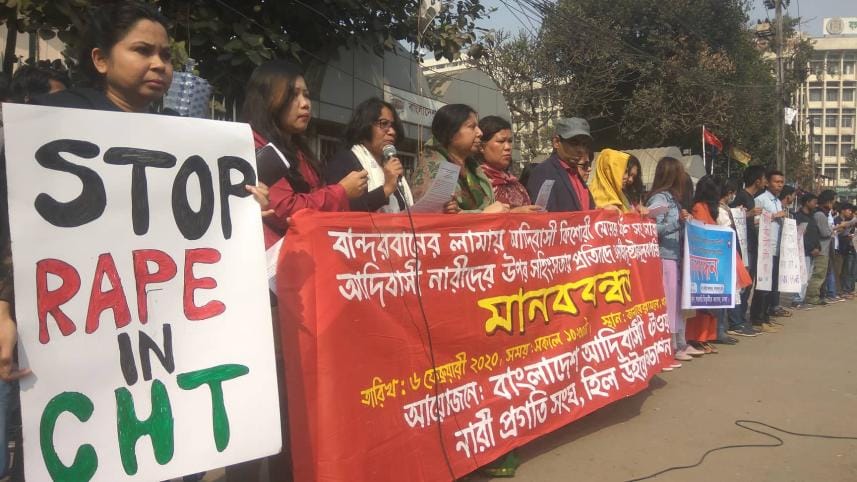Human chain demands exemplary punishment for rapists of minority women, children

Speakers today demanded exemplary punishment for those who raped women and children of ethnic minority communities, including the perpetrator who raped a 14-year-old Tripura girl in Cox’s Bazar six days ago.
They also demanded proper compensation to the family of the teenager and formation of a special cell to take action against all sorts of violence against minority women and children.
Leaders of different ethnic minority communities, university teachers, rights activists and students were speaking at a human chain formed in front of National Museum to protest the Tripura girl rape incident.
The victim, a ninth grader, was raped on January 31 after she went out of her hostel in Lama’s Hebron Mission area to drink water from a tube well nearby.
Police arrested a man, said to be an Awami League activist, on charge of raping the girl.
Falguni Tripura, coordinator of Bangladesh Adivasi Nari Network, said it is a matter of regret that women and children are not safe during a programme where a minister was present.
The rape took place during a political programme, organised by the Bandarban-Lama AL unit. There were several on-duty policemen present as a minister, among others, was present at the programme.
Falguni Tripura alleged that most rapists go unpunished as they have links with influential quarters.
Rape is a strategy to drive out minorities from their own land and country, Dhaka University Prof Robayet Ferdous said.
He stressed on the need for waging a tougher movement instead of just organising programmes like human chains to stop violence against women.
Ishani Chakraborty, a professor of DU’s history department, said that rape and corruption have become epidemic in this country. Now it’s time to declare death sentence punishment for rapists, she said.
“Human rights activists often speak out against death penalty. But when the situation is epidemic, there is no option left,” she added.
Director of Bangladesh Mahila Parishad Jona Goswami; programme officer of Kapaeeng Foundation Khokon Suiten Murmu; Monira Tripura from Bangladesh Adivasi Forum; and leaders of different student associations also expressed their solidarity with the human chain.



 For all latest news, follow The Daily Star's Google News channel.
For all latest news, follow The Daily Star's Google News channel.
Comments